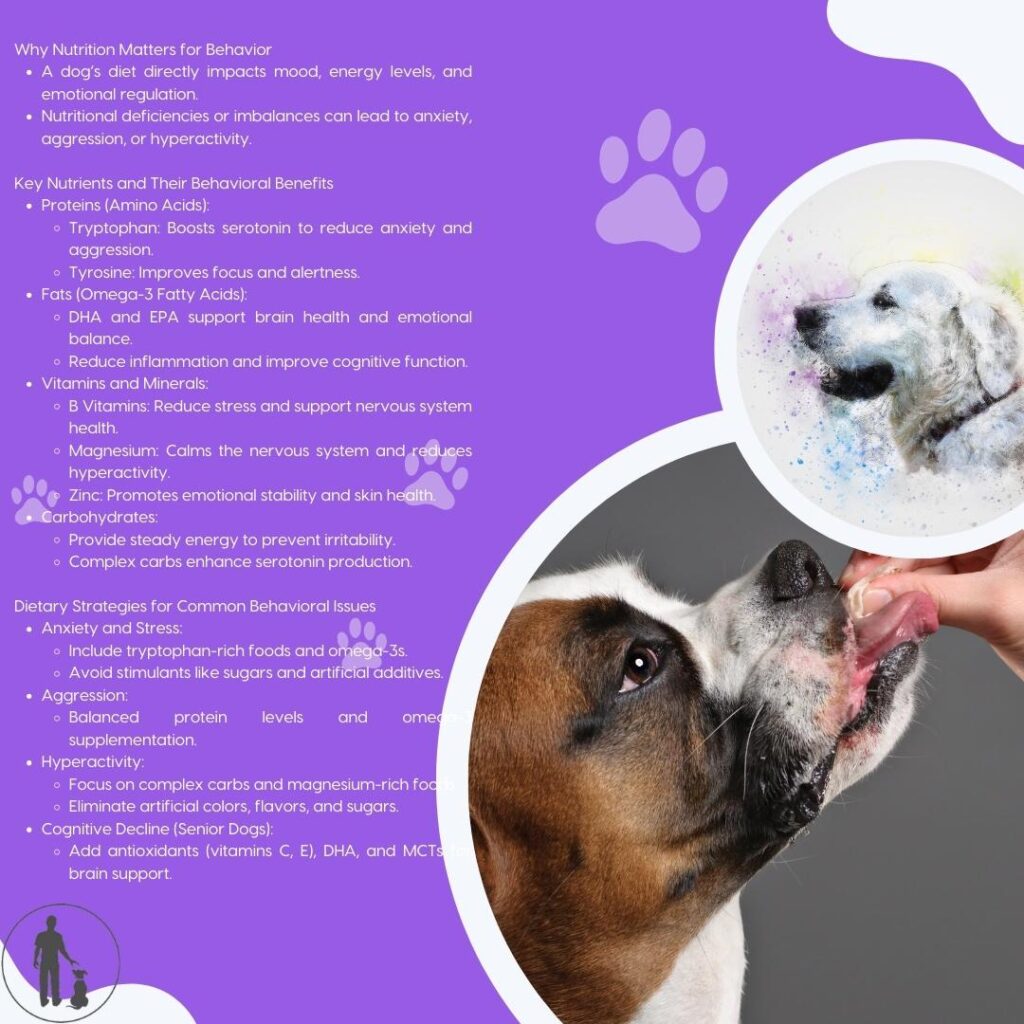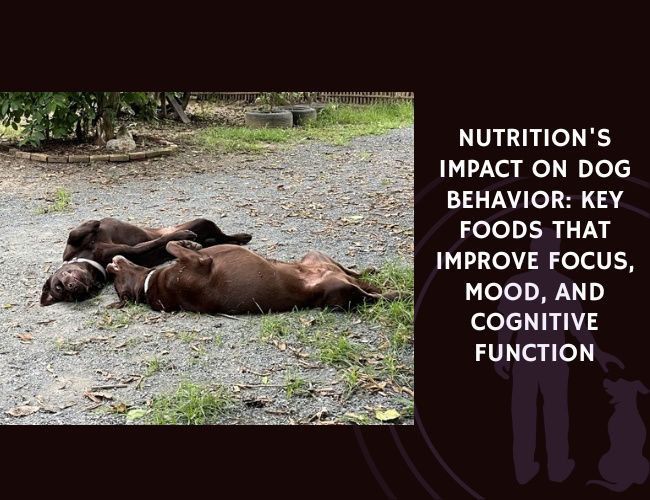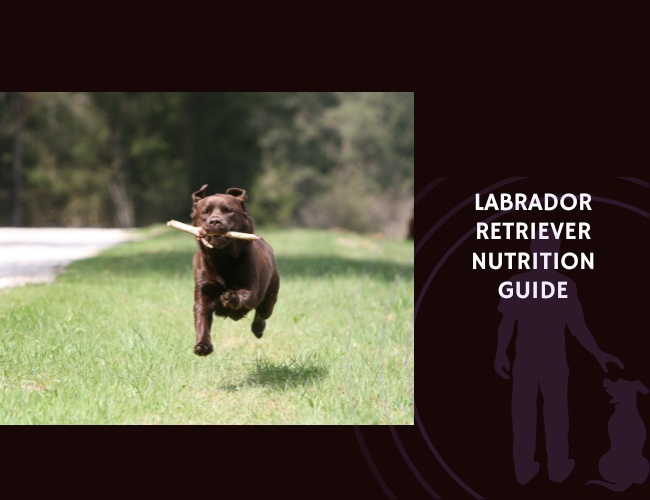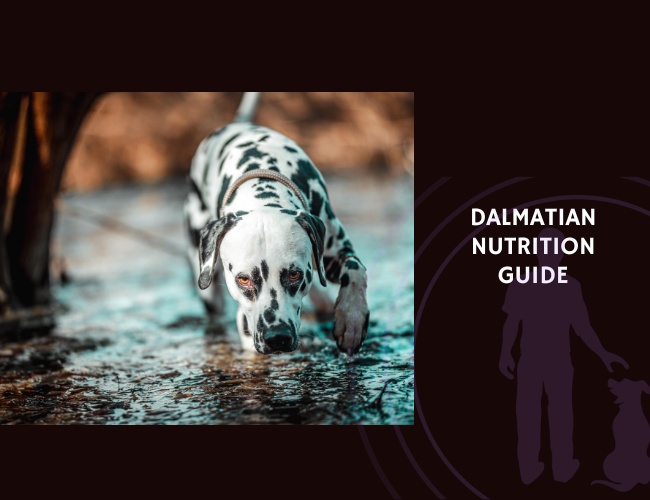Understanding the Nutrition-Behavior Connection
The Fundamental Relationship Between Diet and Canine Cognitive Function
Diet plays a crucial role in a dog’s cognitive function. A balanced diet provides the essential nutrients required for brain health, directly influencing a dog’s mental clarity, memory, and learning ability. Proteins, fats, vitamins, and minerals support various brain functions, ensuring dogs stay sharp and focused. For instance, tryptophan and tyrosine, found in proteins, are vital for neurotransmitter production, impacting mood and cognition. Research has shown that dietary changes can lead to improved behavioral outcomes, such as reduced anxiety and aggression in dogs.
How Nutritional Balance Affects Emotional Regulation and Overall Behavior
Nutritional balance is key to maintaining emotional stability and overall behavior in dogs. Diets lacking essential nutrients can lead to mood disturbances and behavioral issues. For example, a deficiency in B vitamins can increase stress and anxiety levels, while adequate intake supports the nervous system, promoting a calm demeanor. Omega-3 fatty acids, found in fish oil, play a significant role in reducing inflammation and supporting emotional regulation. Diets high in these fatty acids have been linked to lower aggression and better focus.
Conversely, diets high in sugars and processed carbohydrates can lead to hyperactivity and erratic behavior. Ensuring a balanced diet with the right proportions of proteins, fats, carbohydrates, vitamins, and minerals helps maintain steady energy levels, preventing irritability and promoting overall well-being.
The Role of the Gut-Brain Axis in Behavioral Outcomes
The gut-brain axis is an intricate communication network linking the gut and the brain, playing a pivotal role in influencing behavior. The gut microbiome, the collection of microorganisms living in the digestive tract, has a profound impact on this connection. An imbalanced gut microbiota has been linked to behavioral issues like anxiety, aggression, and fearfulness in dogs.
Probiotics and prebiotics help maintain a healthy gut microbiome, supporting emotional stability and behavior. Probiotics are beneficial bacteria that can restore balance in the gut, while prebiotics are fibers that feed these good bacteria. Incorporating these into a dog’s diet can lead to significant improvements in behavior, as demonstrated in studies showing reduced fear responses and improved moods in dogs with a balanced gut microbiome.
To elaborate, protein deficiency can cause lethargy and irritability, negatively affecting a dog’s behavior. Similarly, excessive sugar and carbohydrate intake can result in hyperactivity, making it essential to monitor and adjust dietary composition to foster better behavioral health.
Ultimately, understanding the intricate relationship between nutrition and behavior enables pet owners to make informed dietary choices that contribute to their dogs’ mental and emotional well-being. With a balanced diet, dogs are more likely to exhibit positive behavior, enabling a happier and healthier life.
Through nutrient-rich diets and attention to gut health, we can significantly influence a dog’s behavior and cognitive functions, ensuring our furry friends lead fulfilling lives.
Essential Nutrients for Behavioral Health
Understanding the role essential nutrients play in your dog’s diet is key to improving their behavioral health. These nutrients influence mood, focus, and overall cognitive function, helping your furry friend lead a happier, healthier life.
Key Amino Acids
Tryptophan
Tryptophan is an essential amino acid that acts as a precursor to serotonin, a neurotransmitter responsible for regulating mood and reducing aggression. Dogs with low levels of tryptophan may show signs of increased anxiety and irritability. By ensuring your dog’s diet includes sufficient tryptophan, you can help mitigate these issues and promote a calmer demeanor. A tryptophan-enhanced diet can significantly improve anxiety levels in dogs.
Tyrosine
Another crucial amino acid, tyrosine, serves as a precursor to dopamine and norepinephrine, which are vital for focus and alertness. Adequate levels of tyrosine can enhance cognitive performance, helping your dog stay more attentive and engaged. Incorporating tyrosine-rich foods into your dog’s diet can lead to noticeable improvements in concentration and overall behavior.
Arginine
Arginine has been shown to reduce stress responses and promote a calm demeanor, making it especially beneficial for anxious or reactive pets. This amino acid plays a significant role in regulating stress hormones, thus contributing to emotional stability and better behavior.
Omega-3 Fatty Acids
Omega-3 fatty acids, particularly DHA and EPA, are essential for brain development and function. These fatty acids help reduce inflammation and support emotional regulation. Studies have indicated that omega-3 supplementation can alleviate aggression and improve focus in dogs [Sacchettino et al., 2025]. Including omega-3-rich foods in your dog’s diet, such as fish oil or flaxseed, can have a profound impact on their emotional well-being.
Vitamins and Minerals
B Vitamins
B vitamins, including B6, B12, and niacin, are crucial for nervous system function and can help reduce stress-related behaviors. A deficiency in these vitamins may lead to increased anxiety and cognitive decline. Ensuring your dog receives sufficient B vitamins will support their mental health and prevent stress-induced behavior issues.
Zinc
Zinc influences neurotransmitter function and is vital for maintaining a calm demeanor. A zinc deficiency has been linked to increased aggression and restlessness in dogs. By incorporating zinc-rich foods into your dog’s diet, you can help mitigate these behavioral issues.
Magnesium
Known for its calming effects, magnesium can help reduce hyperactivity and promote relaxation. Ensuring your dog gets enough magnesium can be particularly beneficial for pets prone to hyperactive behavior.
Proper nutritional balance is more than just feeding your dog the right amount of food; it’s about ensuring that their diet includes these critical nutrients. By doing so, you can significantly influence your dog’s cognitive function, emotional regulation, and overall behavior. This holistic approach to nutrition will pave the way for your furry friend to lead a balanced and fulfilling life.
The Gut Microbiome’s Influence
How probiotics and prebiotics support emotional stability
The gut microbiome, home to trillions of bacteria, plays a critical role in your dog’s behavior and emotional health. Probiotics and prebiotics are key players in maintaining a healthy gut. Probiotics are live beneficial bacteria that, when ingested, help to restore and balance the gut microbiome. Prebiotics, on the other hand, are fibers that feed these good bacteria, promoting their growth and activity.
Including probiotics and prebiotics in your dog’s diet can lead to significant improvements in emotional regulation. A balanced gut microbiome can enhance mood and reduce stress levels in dogs. Research has shown that probiotics can reduce fear responses in reactive dogs, making them a valuable addition to the diet of pets prone to anxiety or behavioral issues.
The connection between gut health and behavioral issues
The gut-brain axis is a complex communication network that links the gut and the brain. An imbalanced gut microbiota can disrupt this axis, leading to various behavioral issues such as anxiety, aggression, and hyperactivity in dogs. The gut produces numerous neurotransmitters, including serotonin and dopamine, which are critical for mood regulation and cognitive function.
For instance, an imbalanced gut microbiome has been linked to increased levels of anxiety and aggression in dogs. When the gut flora is out of balance, it can affect the production of mood-regulating neurotransmitters, leading to a heightened stress response and further exacerbating behavioral problems.
Dietary strategies to maintain a healthy gut microbiome
Maintaining a healthy gut microbiome begins with a balanced diet rich in nutrients that support gut health. Here are some dietary strategies to help ensure your dog’s gut stays healthy, which in turn can promote better behavioral outcomes:
- Include Probiotics: Add probiotic-rich foods or supplements to your dog’s diet. Foods like yogurt, kefir, and specially formulated dog treats can introduce beneficial bacteria to the gut.
- Feed Prebiotics: Ensure your dog receives prebiotics such as chicory root, bananas, and asparagus. Prebiotics provide the necessary food for good bacteria to thrive.
- Avoid Excess Sugars and Processed Foods: High sugar and carbohydrate intake can negatively impact the gut microbiome, leading to hyperactivity and erratic behavior. Opt for whole, natural foods instead.
- Hydration: Adequate hydration is crucial for overall gut health. Ensure your dog has constant access to fresh water.
- High-Fiber Diet: A diet high in fiber can promote a healthy gut environment. Fiber aids in digestion and supports the growth of beneficial bacteria. Include fibrous vegetables like carrots, broccoli, and sweet potatoes in your dog’s meals.
By integrating these strategies into your dog’s daily diet, you can support a balanced gut microbiome, which will contribute to more stable emotional health and improved behavior. Balancing the gut microbiome is key to ensuring your canine companion remains happy and healthy.
Proper nutrition directly connects to your dog’s brain health and behavior, making dietary considerations critical in managing behavioral issues. Monitoring and adjusting your dog’s diet based on observed changes can lead to remarkable improvements in their overall well-being and demeanor.

Managing Specific Behavioral Issues Through Diet
Addressing specific behavioral issues through nutritional interventions is a powerful tool for enhancing your dog’s well-being. By tailoring the diet to manage anxiety, aggression, hyperactivity, and cognitive decline in senior dogs, you can significantly improve their quality of life.
Dietary Interventions for Anxiety and Stress Reduction
To manage anxiety and stress, focus on incorporating diets rich in tryptophan, omega-3 fatty acids, and magnesium. Tryptophan, an essential amino acid, serves as a precursor to serotonin, a neurotransmitter that aids in mood regulation. Enhancing your dog’s diet with tryptophan can lead to reduced anxiety and irritability.
Omega-3 fatty acids, found in fish oils, are well-known for their anti-inflammatory properties and their role in emotional regulation. These fatty acids help manage stress and promote a calm demeanor. Magnesium, known for its calming effects, can also help reduce hyperactivity and promote relaxation.
Avoiding stimulants and processed foods is also crucial, as these can exacerbate anxiety and stress. Look for natural, whole food options to keep your dog’s mood balanced.
Nutritional Approaches to Address Aggression and Hyperactivity
Balanced diets with sufficient protein and omega-3 fatty acids can help mitigate aggressive behaviors. Protein is vital for overall health and cognitive function, while omega-3 fatty acids help in reducing inflammation and promoting emotional stability.
Adding calming nutrients such as magnesium and zinc can be highly beneficial. Magnesium helps reduce hyperactivity, and zinc is essential for neurotransmitter function, contributing to a calm demeanor. Avoiding artificial additives and excessive sugars, which can cause erratic behavior, is also recommended. Opt for complex carbohydrates instead, as they provide a steady energy source and help regulate blood sugar levels.
Consider supplements like omega-3s and calming chews or treats that are enhanced with tryptophan. These can provide an extra boost in managing aggression and hyperactivity effectively.
Specialized Nutrition for Cognitive Decline in Senior Dogs
As dogs age, their cognitive function may decline, leading to confusion and altered behavior. For senior dogs, diets rich in antioxidants (vitamins C and E), DHA, and medium-chain triglycerides (MCTs) can support brain health and cognitive function.
Antioxidants help combat oxidative stress, which is linked to cognitive decline. DHA, an omega-3 fatty acid, is crucial for brain development and function, while MCTs provide an efficient energy source for the brain.
Hydration is also essential for maintaining cognitive health. Ensure your senior dog always has access to fresh water, as dehydration can negatively affect cognitive performance and increase irritability.
By focusing on these dietary interventions, you can effectively manage specific behavioral issues in your dog. Tailoring their diet to reduce anxiety, aggression, hyperactivity, and cognitive decline can lead to a happier, healthier, and more well-behaved pet.
Next, we will explore the best practices for implementing these dietary changes and monitoring their effects on your dog’s behavior.
Practical Implementation and Monitoring
Ensuring a balanced and behavior-supporting diet is essential for your dog’s overall well-being. This chapter will provide guidelines for choosing such diets, how to monitor and adjust dietary interventions based on behavioral changes, and the significance of consistent feeding schedules and proper hydration.
Guidelines for Choosing Balanced, Behavior-Supporting Diets
Choosing the right diet is a fundamental step in supporting your dog’s behavior and cognitive function. Here are some key considerations:
- Opt for High-Quality Protein: Essential amino acids found in high-quality proteins are crucial for brain function and mood regulation. Ensure your dog’s diet includes ample amounts of tryptophan, tyrosine, and arginine, which are precursors to neurotransmitters that regulate mood, focus, and emotional stability.
- Include Healthy Fats: Omega-3 fatty acids, particularly DHA and EPA, are essential for brain health and emotional regulation. Incorporate foods like fish oil, flaxseed, and chia seeds to provide these critical nutrients.
- Vitamins and Minerals: Ensure the diet contains B vitamins, zinc, and magnesium. These micronutrients support cognitive functions and help in managing stress and anxiety.
- Probiotics and Prebiotics: These support the gut microbiome, which significantly influences behavior. Foods like yogurt, kefir, and specific dog-friendly probiotics can be beneficial.
- Avoid Artificial Additives: Steer clear of foods with artificial colors, flavors, or preservatives. These can contribute to hyperactivity and inconsistent behavior.
- Hydration: Always ensure your dog has access to fresh water, as dehydration can lead to irritability and cognitive decline.
How to Monitor and Adjust Dietary Interventions Based on Behavioral Changes
Once you have implemented a new diet, monitoring your dog’s response is vital to ensure its effectiveness. Here are steps to follow:
- Observe Behavioral Changes: Keep a close eye on any changes in your dog’s behavior, including their energy levels, mood, and cognitive abilities.
- Track Diet and Health: Maintain a record of what your dog eats and their overall health and behavior. This can help you identify any correlations between diet and behavior changes.
- Regular Veterinary Check-ups: Schedule regular visits to the vet to discuss your dog’s diet and behavior. Your vet can help you make any necessary adjustments to improve the diet’s effectiveness.
- Be Patient: Changes in behavior due to dietary modifications may take some time. Be patient and consistent, and allow several weeks to observe any substantial improvements.
- Adjust as Needed: Based on your observations and veterinary advice, you may need to make adjustments to your dog’s diet. This might include adding supplements, modifying the types of food, or changing feeding times.
The Importance of Consistent Feeding Schedules and Proper Hydration
Consistency in feeding schedules is crucial for maintaining stable energy levels and reducing stress. Here are some tips to ensure a consistent schedule and proper hydration:
- Regular Meal Times: Feed your dog at the same times each day. Consistent meal times can help regulate their metabolism and reduce anxiety related to hunger.
- Small, Frequent Meals: Instead of one or two large meals, consider feeding smaller, more frequent meals. This can help stabilize blood sugar levels and prevent mood swings.
- Hydration Monitoring: Dehydration can lead to irritability and cognitive decline. Ensure your dog has constant access to fresh, clean water. Monitor their water intake, especially during hot weather or after exercise.
- Feeding Enrichment: Incorporate slow-feeder bowls or puzzle toys to make mealtime more engaging. This can provide mental stimulation and prevent boredom-related behavior issues.
By carefully selecting balanced, behavior-supporting diets, consistently monitoring your dog’s response, and maintaining regular feeding schedules with proper hydration, you can significantly improve their behavior and overall well-being. As we continue to explore the dynamic field of dog nutrition, staying informed about emerging trends and research will further enhance your ability to support your dog’s health and happiness.
Future Developments and Research
Emerging Trends in Personalized Nutrition Plans
As our understanding deepens regarding the intricate relationship between nutrition and canine behavior, personalized nutrition plans are emerging as a significant trend. These plans consider genetic, behavioral, and health profiles to tailor diets specifically for each dog. Just as human dietary needs can vary greatly from person to person, dogs also benefit from individualized approaches to their nutrition.
The concept of personalized nutrition extends beyond merely selecting high-quality ingredients. It involves understanding each dog’s unique gut microbiome, which plays a critical role in influencing mood, stress responses, and overall behavior. By analyzing a dog’s genetic makeup and microbiome composition, nutritionists can craft diets that target specific behavioral health concerns, helping to address issues like anxiety, aggression, and hyperactivity more effectively.
New Discoveries in Bioactive Compounds and Supplements
In addition to personalized nutrition plans, the use of bioactive compounds and supplements is gaining traction. One prominent example is cannabidiol (CBD), which has shown promise in reducing anxiety and promoting calmness. Studies have suggested that CBD might help manage stress-related behaviors in dogs, though it is crucial to use it under veterinary supervision.
Other bioactive compounds such as adaptogens—substances that help the body resist stressors—are also being explored. These include ashwagandha and Rhodiola, known for their calming and anti-stress properties. As the scientific community continues to research these compounds, they could become more integrated into canine diets to support behavioral health.
Probiotics and prebiotics remain essential supplements for maintaining a balanced gut microbiome. They not only aid in digestion but also play a significant role in emotional regulation. Specific strains of probiotics have been linked to reduced fear responses and overall improved emotional stability in reactive dogs.

Ongoing Research into Breed-Specific Dietary Needs and Behavioral Impacts
One exciting avenue of research focuses on breed-specific dietary needs and their behavioral impacts. Just as different breeds have unique physical characteristics and health concerns, their nutritional requirements can also differ.
For instance, high-energy breeds might need more carbohydrates for sustained energy levels, while breeds prone to anxiety might benefit from diets rich in calming nutrients like tryptophan. By studying these variations, researchers aim to develop breed-specific dietary guidelines that optimize both physical health and behavior.
Additionally, ongoing research seeks to understand the long-term effects of dietary interventions on behavior. This includes examining how consistent diet adjustments can lead to sustained improvements in mood, focus, and emotional regulation over time. Multi-dog households also present a unique research opportunity, as dietary strategies could be tailored to manage group dynamics and minimize behavioral problems arising from pack interactions.
As we stride forward in understanding the profound connection between diet and canine behavior, these developments in personalized nutrition, bioactive compounds, and breed-specific needs hold the promise of enhancing our dogs’ quality of life in meaningful ways. Stay tuned for the ever-evolving landscape of canine nutritional science, where new insights continue to pave the way for healthier, happier pets.









